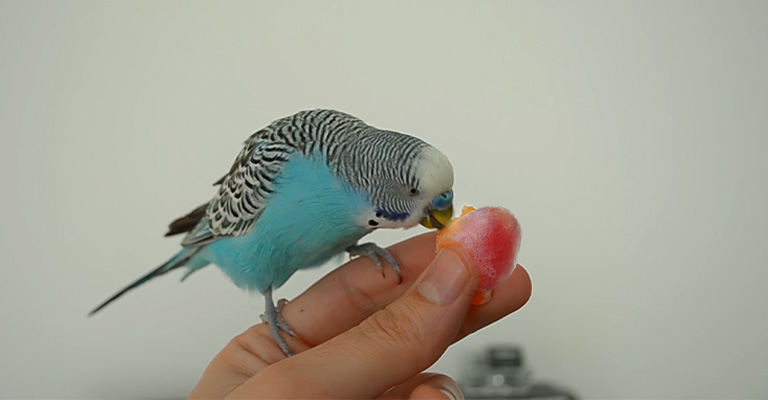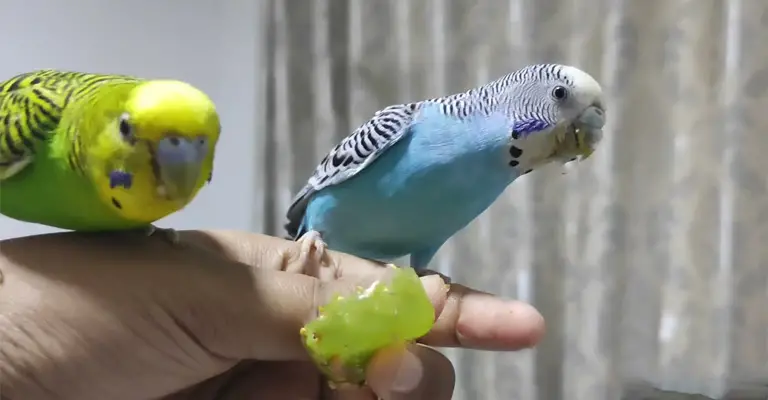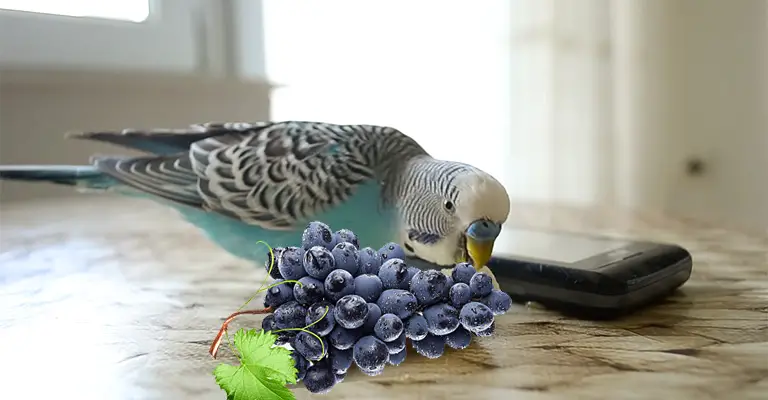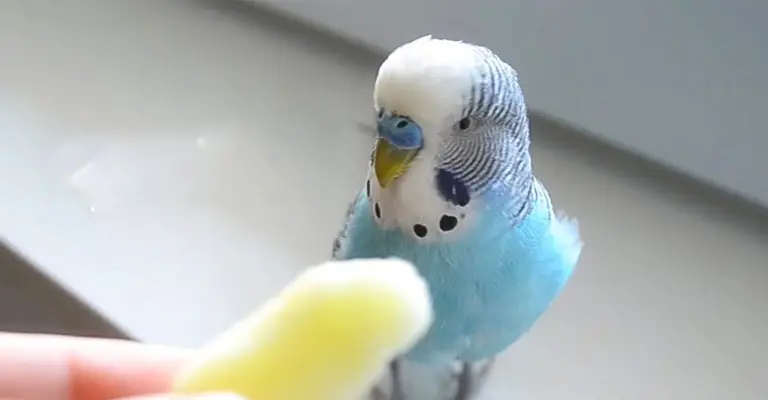The health and well-being of our beloved budgies are of paramount importance to us. However, sometimes, even well-intentioned efforts to offer them a diverse diet can result in unexpected health issues.
A puzzling concern that budgie owners might encounter is the question, “Why does my budgie get sick after eating red grapes?” While grapes are a common human snack and have certain nutritional benefits, their effects on these small avian companions can be complex and potentially problematic.
In this exploration, we delve into various factors that could contribute to your budgie’s adverse reactions to red grapes.
From potential allergens and toxic compounds to digestive sensitivities and interactions with other dietary elements, understanding the intricate interplay between budgies and grapes is essential for their care.
By uncovering the underlying reasons behind this phenomenon, we can take informed steps to ensure the health and happiness of our feathered friends.

Why Does My Budgie Get Sick After Eating Red Grapes?
It’s important to note that I am not a veterinarian, but I can provide some general information about potential reasons why your budgie might get sick after eating red grapes:
Allergic Reaction
Just like humans, birds can have allergies, too. Your budgie might be sensitive to certain compounds present in red grapes, triggering an allergic reaction. This could result in various symptoms like vomiting, diarrhea, or skin rashes.
Grape Toxicity
Grapes, especially their seeds and skin, contain compounds that can be toxic to certain animals, including dogs and possibly birds.
The consumption of these compounds could lead to gastrointestinal distress and other health issues.
Pesticide Residues
Grapes are often treated with pesticides to prevent insect infestations. If these residues are not thoroughly removed, your budgie might ingest harmful chemicals that can lead to illness.
Digestive System Sensitivity
Birds have delicate digestive systems, and some foods that are safe for humans can cause digestive upset in them. The high water content and sugars in grapes could disrupt your budgie’s digestion.
Bacterial Contamination
Grapes might carry harmful bacteria like Salmonella or E. coli, which can cause infections and gastrointestinal disturbances if ingested by your budgie.
Fungal Contaminants

Fungi can grow on grapes, leading to mold formation. Inhaling or consuming mold spores can have adverse effects on your budgie’s respiratory system and overall health.
High Sugar Content
Grapes are naturally high in sugars, which can be problematic for budgies. Birds have different nutritional requirements than humans, and excessive sugar consumption might lead to obesity, diabetes, or other metabolic issues.
Choking Hazard
The size and shape of grapes can pose a choking hazard for small birds like budgies. If the grapes are not properly prepared or if the budgie attempts to swallow a large piece, it might lead to choking or blockage in the digestive tract.
Interaction with Other Foods
If your budgie’s diet is not properly balanced and it’s consuming grapes alongside other incompatible foods, it could result in gastrointestinal distress due to improper nutrient absorption or interactions between different food components.
In any case, if you suspect that red grapes are causing health issues for your budgie, it’s best to avoid giving them this fruit and consult a veterinarian who specializes in avian care. They can provide personalized guidance based on your budgie’s health history, diet, and specific needs.
What Are The Nutritional Values Of Grapes To Budgies?

Grapes are a popular fruit enjoyed by humans, but when it comes to feeding budgies, there are a few nutritional benefits to consider.
Keep in mind that while grapes can offer some benefits, they should be given in moderation and as part of a balanced diet.
Here are some potential nutritional benefits of grapes for budgies:
Hydration
Grapes have a high water content, which can contribute to maintaining your budgie’s hydration levels, especially during warmer periods. Proper hydration supports various bodily functions and overall well-being.
Natural Sugars
The natural sugars found in grapes can provide a quick source of energy for budgies. However, due to their small size, budgies should consume sugars in moderation to avoid potential issues like obesity or diabetes.
Vitamins
Grapes contain vitamins like vitamin C, which play a role in boosting the immune system and supporting the overall health of your budgie. Vitamin C also contributes to the health of their feathers and skin.
Antioxidants
Grapes contain antioxidants that can help neutralize harmful free radicals in your budgie’s body, potentially reducing the risk of oxidative stress and certain health issues.
Flavonoids
Flavonoids present in grapes, such as quercetin and resveratrol, have anti-inflammatory properties. These compounds might aid in reducing inflammation and promoting general health in budgies.
Minerals
Grapes contain minerals like potassium, which is essential for maintaining proper heart function, muscle contractions, and fluid balance in budgies’ bodies.
Variety in Diet
Introducing grapes as an occasional treat can add variety to your budgie’s diet. Offering a diverse range of foods can help prevent dietary deficiencies and boredom.
Natural Fiber
The fiber in grapes can contribute to digestive health in budgies by promoting regular bowel movements and preventing constipation.
Enrichment
Feeding grapes as a treat can serve as a form of mental and physical enrichment for your budgie. They will enjoy exploring new flavors and textures, which can help keep them mentally stimulated.
While these potential benefits are noteworthy, it’s crucial to remember that grapes should only be offered in small amounts and as part of a larger, balanced diet.
Always prioritize budgie-friendly foods such as fresh vegetables, high-quality pellets, and a limited amount of fruits.
Consulting with an avian veterinarian or an avian nutritionist can provide you with personalized guidance on creating the healthiest diet for your budgie’s specific needs.
How Can I Serve Grapes To Budgies?

When offering grapes to budgies, it’s important to prepare them in a way that ensures safety, encourages interaction, and promotes proper consumption.
Here are some effective ways to serve grapes to budgies:
Whole Grapes
Provide small, seedless grapes with the skin on. Wash them thoroughly to remove any pesticides or residues.
You can attach the grapes to the cage bars or place them on a clean dish. Budgies might enjoy pecking at the grapes and extracting the juicy interiors.
Sliced or Halved Grapes
To minimize the risk of choking, slice or halve the grapes into smaller pieces. This makes it easier for your budgies to manage and consume the fruit. Place the slices on a dish or hang them in the cage for your budgies to explore.
Skewers or Kabobs:
Skewering grapes on a thin, safe wooden skewer can create an engaging activity for your budgies. Alternate the grapes with other bird-safe treats or vegetables to add variety and encourage healthy eating habits.
Mixed with Other Foods
Incorporate grapes into a budgie-friendly salad by combining them with chopped leafy greens, shredded carrots, or other safe fruits. This mixture provides a range of textures and flavors while also ensuring a balanced diet.
Frozen Grapes
During hot weather, you can freeze grapes and offer them as a refreshing treat. Frozen grapes can provide relief from the heat and encourage your budgies to stay hydrated while enjoying a novel texture.
Before serving grapes or any other new food to your budgies, take some precautions:
Wash Thoroughly
Clean the grapes thoroughly to remove any potential pesticides or contaminants. Organic grapes might be a better option if available.
Moderation
Grapes should be offered in moderation as a treat, not a staple food. A small piece or a few grapes a couple of times a week is sufficient.
Observation
Watch how your budgies interact with grapes. If they show interest and enjoy eating them, you can continue offering them occasionally. If they seem disinterested or experience any digestive issues, it’s best to discontinue serving grapes.
Remove Seeds
Make sure to remove any seeds from the grapes, as they can be a choking hazard. Seedless varieties are preferable.
Rotate Foods
While grapes can be a tasty addition to your budgies’ diet, it’s important to offer a variety of other safe fruits, vegetables, and budgie pellets to ensure a well-rounded and balanced diet.
Remember that each budgie is unique, and their preferences and tolerances can vary. If you notice any adverse reactions or changes in behavior after introducing grapes or any other new food, consult with an avian veterinarian for guidance.
FAQ
Budgies might get sick after consuming red grapes due to their sensitive digestive systems.
Grapes’ skin and seeds contain compounds that can be toxic to birds. Additionally, their high sugar content and potential for mold growth can lead to gastrointestinal issues and other health problems in budgies.
Yes, red grapes can trigger allergic reactions in budgies, similar to humans. Some birds may be sensitive to specific compounds in grapes, leading to symptoms such as vomiting, diarrhea, or skin irritation.
Monitoring your budgie’s reactions and consulting a vet is advisable if you suspect an allergy.
Both the skin and seeds of grapes contain potentially harmful compounds for budgies.
The skin may have pesticide residues, and the seeds can be toxic. It’s safer to offer seedless grapes and remove skin and seeds if you choose to feed grapes, although moderation is key.
If you choose to offer grapes, introduce them gradually in small, well-cleaned portions. Slice or halve grapes to reduce choking hazards. Watch your budgie’s reactions closely.
If any signs of distress or digestive issues arise, discontinue grape consumption and consult a vet.
Yes, many fruits can be offered to budgies in moderation. Safe options include apples, berries, pears, and melon.
Always remove seeds and pits, and ensure that the fruits are thoroughly washed. Consulting with an avian veterinarian or nutritionist can help create a well-rounded, safe, and balanced diet for your budgie.
Conclusion
In the world of avian companionship, providing a balanced and safe diet is a foundational responsibility. The question, “Why does my budgie get sick after eating red grapes?”
underscores the significance of understanding our pets’ unique dietary needs. As we’ve explored the potential reasons behind this puzzling scenario, it’s clear that factors ranging from allergic reactions and toxic compounds to digestive sensitivities and diet composition can play pivotal roles.
Vigilance, moderation, and a nuanced approach to introducing new foods are key components of responsible budgie care. If your budgie does experience adverse reactions after consuming red grapes or any other food, seeking guidance from avian veterinarians is crucial.
Ultimately, by tailoring their diets to their specific requirements and being attuned to their responses, we can cultivate a healthy and nurturing environment that supports the well-being of our cherished budgies.